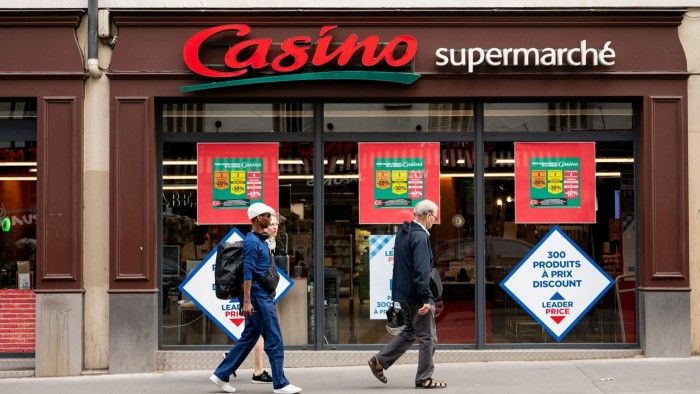Traders dump Casino debt as fears grow over troubled grocer

Unlock the Editor’s Digest for free
Roula Khalaf, Editor of the FT, selects her favourite stories in this weekly newsletter.
The value of French grocer Casino’s debt has slumped to deeply distressed levels, as fears grow that continued weak earnings could trigger a breach of its loan covenants next year.
Casino, which has lost market share to rivals in France’s crowded food retail sector, has come under renewed pressure from debt markets in recent weeks, with traders now quoting a €1.4bn secured loan at 61 cents on the euro.
The deep discount to face value suggests lenders are braced for the prospect of steep losses, little over a year after Casino concluded a bruising restructuring in which more than €5bn of debt was wiped out and exchanged for equity.
Casino’s previous owner, Jean-Charles Naouri, built the retailer into a global player with a series of highly leveraged takeovers. It owned a large portfolio of supermarkets and hypermarkets in France, coupled with an international business stretching from Asia to Latin America.
But after years of struggling under heavy debts, which left Casino starved of investment, the retailer was forced to capitulate and agree to a comprehensive debt restructuring in 2023, which saw Czech billionaire Daniel Křetínský take control.
The French supermarket group, which reported sales of almost €9bn last year, has a market value of less than €250mn. Its gross debt stood at €2bn at the end of 2024.
Clément Genelot, an equity analyst at Paris-based investment bank Bryan Garnier, wrote in a recent note that there were “still no signs of commercial recovery” at the cash-burning retailer and that the need for more capital from Křetínský, who owns a 53 per cent stake, cannot be ruled out.
A person close to Křetínský said he “always had in mind” that a second capital increase could be needed. The person added that while this could prompt negotiations with creditors, it would not entail a full-blown debt restructuring.
Several restructuring advisers told the Financial Times that they were actively seeking mandates with Casino’s different classes of creditors for any potential discussions, however.
Casino declined to comment.
Distressed debt investors said Casino’s weak earnings have driven fears of a looming covenant breach. The retailer’s auditors in March noted that a breach may lead lenders to request “immediate repayment” of their loans, some of which have cross-default clauses that could impact Casino’s other debts.
As part of last year’s restructuring Casino agreed to a set of strict covenants on the €1.4bn secured loan and a separate €711mn credit line from banks, which it has to comply with from September. Failing to do so could spark a further renegotiation of its debt.
One of these terms dictates that the ratio of net debt to earnings in its core business must be below 8.34 times. Casino reported that this leverage ratio stood at 14.6 times at the end of March, up from 4.9 times a year earlier, as a result of its declining profits.
Genelot said Casino should still be able to comply with its debt terms by the end of the year, but there was a “high risk” of a covenant breach next year.
Rating agency Fitch has ranked Casino’s secured loan at CCC-, putting it in a bracket that indicates “substantial credit risk” where “default is a real possibility”.
Casino boasted a strong investment-grade credit rating a decade ago, while its owner Naouri was a stalwart of the French elite, widely lionised for his business acumen.
The portfolio he built has been dismantled as the group sold off stores and subsidiaries to reduce overheads and service its debt — although it has retained its valuable domestic network of inner-city stores, trading under brands including Monoprix and Franprix.
Additional reporting by Euan Healy and Ian Johnston








